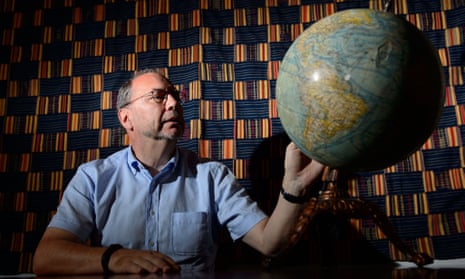Face masks should be compulsory for adults in all public and enclosed spaces, such as shops, according to a leading infectious diseases expert.
Prof Peter Piot, the director of the London School of Hygiene and Tropical Medicine, said he did not understand why the government had only ordered their use on trains, tubes and buses in England.
“I don’t understand why it is not official policy to have compulsory face masks not only on public transport but when you go into public places, enclosed places and shops and all that,” said Piot in an interview with the Guardian.
He contrasted Britain with Japan, where people use face masks even if they have a cold in the interests of protecting others, and have done since the Spanish flu pandemic in 1918, he said. Hong Kong, Singapore and Taiwan have also adopted masks as “an act of civic duty and of the collective wellbeing”.
But here, he said, politicians and many in the scientific community were opposed. “I can imagine the debates. Britain is a nation of people who want absolute evidence, and the evidence for masks is more ecological, as we say. There are very few randomised controlled trials. But even if they are not 100% effective, if everybody wears one, we know from other countries that it works.”
The US, he said, was “a natural experiment” with some states requiring people to wear masks while others do not. Recent data has suggested that in those where masks are compulsory, “they have much lower incidence”, he said.
But it seems to have become a political issue there, he said. “Someone who wears a mask is a Democrat or a Republican who doesn’t support Trump.”
Piot was seriously ill with Covid-19 himself. The virologist co-discovered Ebola in the Democratic Republic of Congo in 1976 when he was just 27 and is the former head of the UN’s programme on HIV and Aids, leading research in Africa.
But he said it was the coronavirus that nearly finished him. Now, he believes he is immune, at least for a year or two.
“I wear a mask wherever I go. For me, it is to remind people that there is an epidemic.”
He added: “We need to take stock, with infections and deaths falling, and learn lessons for the spikes to come”, warning that the virus could be around for many years. “We need to realise – and it’s sobering – that we are at the beginning of what may be a multi-year type of epidemic.”
Acute outbreaks could give way to more endemic infection with waves that flare up.
“That could be a pattern for many years, even when we have a vaccine,” he said. It was unlikely the first vaccines would be 100% effective or block transmission, though they might stop so many people dying or becoming seriously ill.
“We probably will have to get to a situation of societies living with covid. We have seen it with HIV, although it is very different. But first there were active epidemics and now it is ‘normal’ that there are 700,000 people dying every year and we still have infections. But this is a respiratory virus and far more infectious than HIV.”
Without a vaccine that works well, “we will have to constantly live with this kind of risk that we have at the moment”, he said. “The biggest concern I have is for older people.”
As with HIV, “an epidemic reveals the fault lines in society. The big one this epidemic has revealed is how we treat the elderly. We often park them in pre-mortuary type institutions and give a bit of money and hope it is OK”.
Masks would help to safeguard them and care homes would need “constant and intensive testing to make them a safe environment”.
“The key for policy today is to make certain that high-risk situations and places are safe – the whole of the NHS and health services and care homes and now meat-processing plants and there may be others.”
We need to apply the lessons, he said. “It could be Leicester, another factory, a university, a neighbourhood. We should be better prepared. It is a combination of national action and local policies but also individual behaviour. I understand – I’m dying to get out and see friends and family but let’s hope people are going to respect as much as possible all these absolutely essential precautions.”
